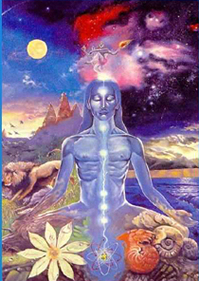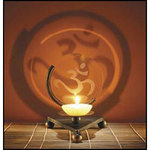|

The IndoPagan Project is committed to leading the way in determining what should constitue IndoPagan clergy, so that
the community as a whole can be best served. There is a great lack of resources, especially of experienced elders and available
clergy.
It is the belief of T.IP.P. that the emerging IndoPagan Clergy should be willing and able to service the majority
of the IndoPagan community, regardless of sectarian or personal deity choices - because that is what the community
is in most need of at this time.
Because a clergywo/man of this nature would need to be able to aid and facilitate such a wide variety of individuals
it would require a great deal of personal committment to cross-cultural and inter-cultural education.
** Please be aware that there is currently no standard, and the debate of what that standard should be is still being
highly debated within the IndoPagan community.**
At this point in time, we believe that the following is what would be needed to constitute bestowing the title of IndoPagan
Clergy upon an individual:

|
|
1) One must be able to readily access the energies of at least the major divinities of Hinduism
and, to some extent, Vedic religion - i.e. Krishna, Radha, Vishnu, Rama, Hanuman, Kali, Shiva, Lakshmi, Saraswati, Durga,
Parvati-Uma, Ganesha, Agni, Indra, Surya, Ganga, Gayatri - and have the skills to access other divinities if necessary to
a community member for a ritual or other purpose.
Some might eventually extend this to include the Buddhist pantheon as
well - or perhaps decide to designate a seperate
Buddhist IndoPaganism "sect". Although the fact that some IndoPagans incorporate elements of Hinduism and Buddhism into their
practice complicates things. It is for this reason that I believe that intensive comparitive religious studies are also
a pre-requisite for clergy, so that they can have a good grasp of most concepts that may come their way.
[I know
this seems excessive to some. However, the IndoPagan
community is too "new" and relatively small - not to mention
scattered
- to make the luxury of seperate Diety &/or sectarian
IndoPagan clergy (i.e. priest/esses of Shiva, priest/esses of
Durga-
Kali, priest/esses of Krishna, Shakta priest/ess, Shaiva priest/ess,
Vaisnava priest/ess) reasonable at this
time. It makes for a much
more challenging beginning to a tradition to be sure! It ends up
requireing a GREAT deal more
comparitive education on the part of
the clergy members. I think that deity-specific priest/esses will be
a good interim
solution - however, I am worried that many who are in
desperate need of the services of IndoPagan clergy will be left
behind
if they cannot find priest/esses who are able to aid a wide
variety of Indo-sectarian Pagans.]
2)
One must have enough of a grasp of Sanskrit to be able to learn and perform mantras as necessary to rituals for community
members.
This does not imply that one must be fluent in Sanskrit, however enough of a working familiarity with the basic
pronunciation to make performing mantras - even initally infamiliar ones - possible, if necessitated by the needs of a community
member.
3) Have a good grasp of the rites of passage traditional to Hinduism and NeoPaganism,
and be willing and able to write and perform appropriate rituals. Also the ability to adapt rituals to suit the individual
needs of community members would be necessary.
There may indeed be a need for seperate IndoPagan
and IndoWiccan
clergy eventually, as Wicca does have a very specific ritual structure - however, I do not think
the community can support that division at this time. Therefore IndoPagan clerics would need to understand how to perform
Wiccan ritual (avoiding the unavoidable debate as to whether an uninitiated Wiccan could perform a Wiccan ritual - obviously
in the case of Traditional Wiccan sects, this would be impossible, however I believe that any experienced and knowledgable
NeoPagan cleric should and would be able to perform an 'eclectic' or 'non-denominational' Wiccan ritual).
4) Have a significant amount of knowledge of and working experience with a variety of the major belief systems within
Hinduism and NeoPaganism. Around 5-10 years of intensive study is a reasonable amount of time to expect an IndoPagan
clergywo/man to spend in preparation for service as a cleric.
5) Be willing
and able to facilitate the spiritual growth of
aspiring IndoPagans, being knowledgeable enough to be able to steer them
to resources appropriate to their deity &/or sectarian choices - even if it is outside of the personal preferences of
the cleric. This would also include providing unbiased aid to those who were still exploring their preferences.
6) Regularly contributing written material and spiritual resources to the IndoPagan community and NeoPagan community
- preferrably in NeoPagan periodicals as often as possible, or other widely distributed materials - as a whole to help raise
awareness and promote community growth and stability.
Again, these are all things that are still
being debated within the
IndoPagan community. I would say that these things should be mandatory at this point in time.
Others are still discussing whether or not IndoPagan clergy should have to adhere to the restrictions that Hindu priests
do - such as vegetarianism in some sects, celibacy, etc. I believe that such major vows are ones that are to be made between
the priest/ess and the deity, and are more monastic in nature than clerical - they are not necessary for successful
functioning in an IndoPagan Clerical context.
|



